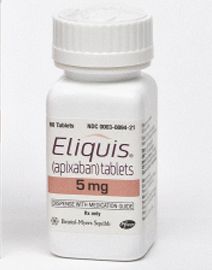Top Class Actions’s website and social media posts use affiliate links. If you make a purchase using such links, we may receive a commission, but it will not result in any additional charges to you. Please review our Affiliate Link Disclosure for more information.

According to various Eliquis lawsuits, one of the main conditions that Eliquis is prescribed to treat is atrial fibrillation. In their December 2012 Press Announcement, the FDA reported:
“Atrial fibrillation, one of the most common types of abnormal heart rhythm, is an abnormal, irregular, and rapid beating of the heart in which the heart’s two upper chambers (atria) do not contract properly, allowing blood clots to form in them.These clots can break off and travel to the brain or other parts of the body.”
Dr. Norman Stockbridge, the FDA’s director of the Division of Cardiovascular and Renal Products, explained that “blood clots in the heart can cause a disabling stroke if the clots travel to the brain,” and “anti-clotting drugs lower the risk of having a stroke by helping to prevent blood clots from forming.” Eliquis works by blocking certain clotting proteins in the blood, thus preventing clots from forming as Dr. Stockbridge stated. However, Eliquis has been associated with internal bleeding medication side effects, including: bleeding on the brain, intestinal bleeding, kidney bleeding, uncontrolled bleeding and deep vein thrombosis (DVT).
The FDA stated that it had studied more than 18,000 patients in a clinical trial that compared Eliquis with warfarin (Coumadin), a traditional blood thinner that has been around since the 1950s. Warfarin also carries the risk of internal bleeding and requires patients to regularly monitor their blood and adhere to dietary restrictions.
According to the FDA, “In the trial, patients taking Eliquis had fewer strokes than those who took warfarin.” This FDA assessment of Eliquis, along with the drug manufacturers’ superior marketing, led many health care professionals to believe that Eliquis along with new generation blood thinners would surpass and even replace warfarin. However, the reports of dangerous Eliquis side effects has caused the U.S. medical community to reconsider this initial prediction.
Background on Eliquis Side Effects
Eliquis is in the same class of relatively new blood thinners as Pradaxa and Xarelto, also alternatives to warfarin. Like warfarin, the drugs have a risk of internal bleeding in the stomach, under the skin’s surface, and within the brain.
Pradaxa, Xarelto, and now Eliquis’ side effects include severe internal bleeding and even death. These blood thinning drugs are also associated with side effects such as: thrombosis (blood clots), decreased hemoglobin (a substance that carries oxygen in red blood cells), cerebrovascular accidents (an event that leads to a cerebral hemorrhage), hematoma (a semisolid mass in the blood), peripheral edema (swelling of the lower limbs), and dyspnea (difficulty breathing).
There is no known cure to reverse the type of internal bleeding caused by Pradaxa, Xarelto or Eliquis.
The lack of a bleeding antidote has led to thousands of product liability lawsuits against the manufacturers of Pradaxa, Xarelto and Eliquis, accusing the drug makers of manufacturing and selling dangerous drugs and failing to warn patients and physicians that a reversal agent does not exist.
Do YOU have a legal claim? Fill out the form on this page now for a free, immediate, and confidential case evaluation. The Eliquis attorneys who work with Top Class Actions will contact you if you qualify to let you know if an individual lawsuit or Eliquis class action lawsuit is best for you. [In general, Eliquis lawsuits are filed individually by each plaintiff and are not class actions.] Hurry — statutes of limitations may apply.
Get Help – It’s Free
Join a Free Eliquis Class Action Lawsuit Investigation
If you or a loved one took Eliquis (apixaban) and suffered injuries such as uncontrollable internal bleeding, gastrointestinal bleeding, hemorrhaging, kidney bleeding or death, you may have a legal claim. See if you qualify by filling out the short form below.
An attorney will contact you if you qualify to discuss the details of your potential case at no charge to you.
Oops! We could not locate your form.
ATTORNEY ADVERTISING
Top Class Actions is a Proud Member of the American Bar Association
LEGAL INFORMATION IS NOT LEGAL ADVICE
Top Class Actions Legal Statement
©2008 – 2024 Top Class Actions® LLC
Various Trademarks held by their respective owners
This website is not intended for viewing or usage by European Union citizens.












